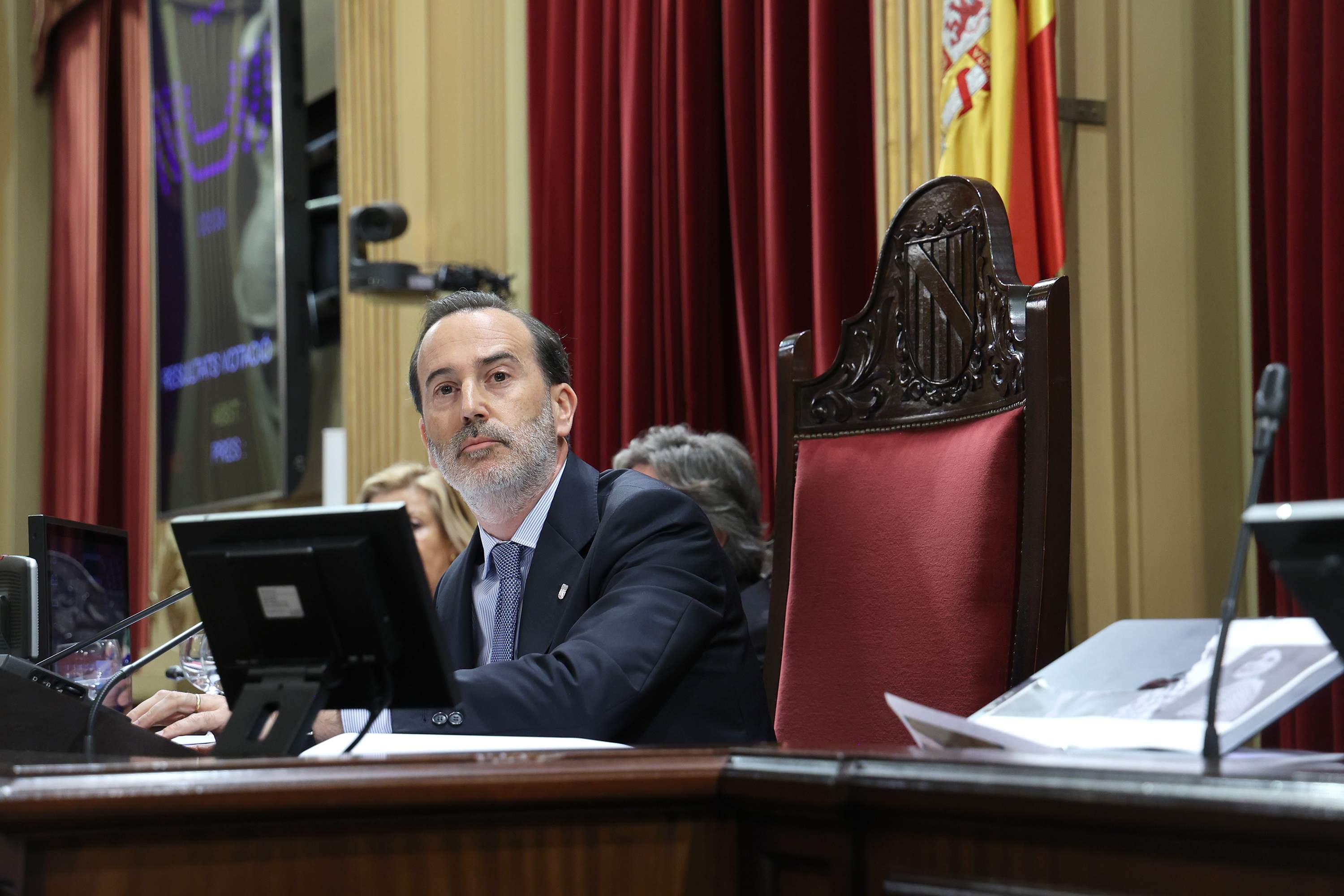Gabriel Le Senne, speaker of the Balearic Islands Parliament starred in a regrettable scene in the chamber this Tuesday, when he tore up a photo of Aurora Picornell (a union leader shot by the Franco regime) and expelled two members of the parliamentary Bureau who were showing images of victims of the Spanish dictatorship. All of this, during the debate on whether to hear far-right Vox's bill to repeal the law of democratic remembrance. The day after the incident, the far-right politician dug himself deeper into the controversy: these are the 15 absurdly unconvincing excuses of Gabriel Le Senne (Vox) for the scandal in the autonomous community parliament of the Baleares.
As a result of social, political and media pressure, the speaker of the house's media team issued a statement this Wednesday with fifteen "precisions" about the events - although without resigning or apologizing for his violent attitude towards two Socialist deputies, Mercedes Garrido and Pilar Costa. To summarize, Le Senne argued that "both the speaker and the rest of the Bureau have to remain neutral in debates" and that both Garrido and Costa "displayed clearly partisan signs." It seems, though, that neutrality only applies in certain cases, since the far-right leader has come to use his position to harshly criticize the amnesty law.
Le Senne justifies violence against Garrido
Along these lines, the speaker of the house affirmed that he tried to convince the Socialist deputies privately, but that they did not listen and he decided to "let the infraction pass." "However, complaints were growing from numerous MPs from different groups about the lack of respect for the chamber and the Bureau," he added, which is why he threatened Garrido and Costa with expulsion from the chamber. "Expel us," he asserts that they responded. Thus, Le Senne proceeded to expel them for "their rebellious attitude."
Worst of all is the interpretation that the far-right leader made of the parliamentary regulations, which say that "the speaker will adopt the measures that he considers appropriate to make the expulsion effective." Quoting this rule, Le Senne justified his own use of violence against Garrido, instead of resorting to the services of the chamber: "When Mrs Garrido refused to remove the poster and leave the chamber, the speaker himself closed the Mrs Garrido's computer, to put an end to the flagrant violation. When Mrs Garrido opened it again, the president tried to remove the poster that was showing. In no case was it his intention to break it."
‼️ El president del Parlament balear ha estripat una foto d'Aurora Picornell, afusellada pel franquisme
— ElNacional.cat (@elnacionalcat) June 19, 2024
➡️Ha expulsat les dues membres de la Mesa del Parlament, Mercedes Garrido (@GarridoMercedes) i Pilar Costa (@pilarcosta), que tenien imatges de víctimes de la dictadura pic.twitter.com/YwhP5dluXO
The moment when the Baleares speaker Gabriel Le Senne (Vox) gives 3 warnings to fellow Bureau member Mercedes Garrido to withdraw the printed images mounted on her laptop, before suddenly reaching out and tearing the image; after which Garrido leaves the chamber, as does Pilar Costa who is also warned. As other MPs also show images of the victims of Francoism, Le Senne comments: "Now do you have the show you were looking for?"
The Balearic Parliament speaker portrays himself as the victim
Thus, another of Le Senne's conclusions is that "it is not possible to condemn the speaker's actions" if the "provocative" attitudes of the deputy speaker and second secretary of Parliament are not first condemned. That is to say, the fault lies with the victims. But it didn't end there: the speaker denounced an alleged "campaign of harassment, insults and threats that he has been suffering on social media." "Any attempt to undermine the neutrality of our institutions is an attack against democracy and the rule of law," concluded the far-right leader, who insisted that neutrality is only applicable when it suits him: it is only invoked through the victims of Francoism and the defence of LGTBI rights, but not when there is an attack on a law approved by a majority in the Congress of Deputies.
After issuing his statement, Le Senne responded into the microphones of RTVE's Informatiu Balear, affirming that the disobedience of the Socialist deputies made him lose his "temperament." Once again, the culprits are Garrido and Costa, not him - the second highest authority figure of the Balearic Islands.
Who was Aurora Picornell?
On January 5th, 1937, amidst the Spanish Civil War, a group of Francoist paramilitary executed by firing squad Aurora Picornell Femenías (24 years old), Belarmina González Rodríguez (22 years old), Caterina Flaquer Pascual (60 years old) and Caterina's daughters Antònia Pascual Flaquer (25 years) and Maria Pascual Flaquer (22 years). The group of Mallorcan women are remembered as ses roges des Molinar - the roses of Molinar - were a group of seamstresses and embroiderers from the Molinar neighborhood of Palma, who were prominent as union organizers and political activists during Spain's Second Republic, which preceded the war.

Spain's laws of democratic remembrance are a belated attempt by Spanish society to clarify facts and give dignity and redress to the many human rights violations that occurred during the Spanish Civil War in the 1930s and the four-decade Franco dictatorship which followed. Because of Spain's "Pact of Forgetting" at the end of the Franco dictatorship in the 1970s, many facts never came out, and the passing of the 21st century laws of democratic remembrance at both Spanish and autonomous community levels has faced on-going opposition from the right.

